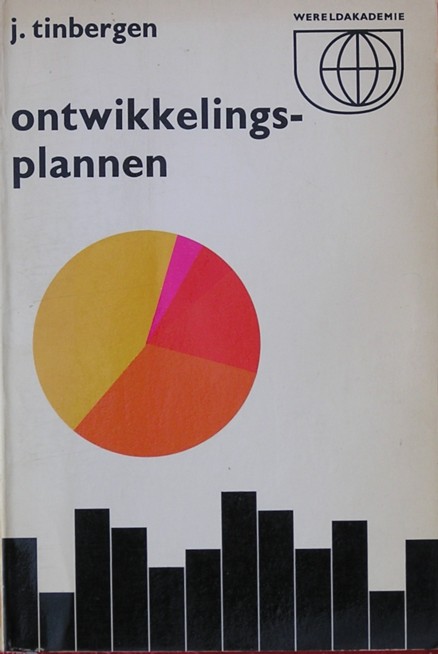

The famous Dutch economist Jan Tinbergen is one of the intellectual fathers of the planned economy. He has, perhaps more than any other economist, published about this subject, certainly in the Netherlands. And since Tinbergen in 1933 (in the middle of the Great Depression) wrote the book De konjunktuur for the cadre members of the labour movement, he has also continued to publish popular texts, hoping to increase the understanding of the people with regard to the economic developments. Thus the book Ontwikkelingsplannen1 characterizes his writings. It is a cheap edition (pocket-book format) with an attractive layout and with many appealing illustrations. The book gives a clear explanation of the economic planning in all aspects. But although Tinbergen really tries, the subject is yet so complex, that a bachelor degree in economics is required to fully understand the text.
For, it is unreasonable to expect of the interested layman, that he can grasp the economic meaning of for instance the capital coefficient or of external effects. Similarly, the reader is expected to know the difference between for instance the gross domestic product and nett national investments. Besides, Tinbergen uses complex mathematics for rather abstract models, such as the input/output table (p.96 and further), for linear programming (p.238) and even for the optimization of the regional structure (p.247). And when Tinbergen suggests to skip these paragraphs, if desired, then one wonders why they have been included in the book. Perhaps Tinbergen believed that they are necessary for those cases, where Ontwikkelingsplannen is used in education.
These remarks make clear, that Ontwikkelingsplannen is not meant for people, who get easily discouraged. Incidentally, economic planning is not really an exciting and fascinating subject. The matter is evidently related to the theory of administrations and organizations, and these have the reputation of being dull. Nonetheless, it is worth reading about, because it increases the understanding of the complexities of the social processes. And Tinbergen really tries to always make the argument concrete, by given examples from practice. Those who take the time to digest the matter, will notice that the various aspects of planning are true brain teasers. And Tinbergen is an excellent sparring partner for those, who want to form or test their own opinion.
A particular quality of Ontwikkelingsplannen is, that Tinbergen does not restrict his story to the modern industrial states, but also explains how planning can be applied usefully in the states of the Third World. These include, besides Africa and the Far East, also South-America and Asia. At the time one already realizes, that the poor states can make up arrears. State interventions can accelerate that process2. The abstract thinker Tinbergen predicts that the United Nations will develop into a kind of world government. The planning must be legitimized in a democratic manner, because the people must define their own well-being. Next the general interest imposes certain boundary conditions on the economic system (employment, growth, price stability and the like). Tinbergen advocates the establishment of central planning agencies, because of the complexity of the economic policy.
Tinbergen describes the usual organization and methods of economic planning. The state must engage in production, when the free markets create essential external effects. Tinbergen couples this choice to the then systems race between the capitalist west and the Leninist east. Planning can best be divided in phases, from globally to detailed (at the macro-, meso- and micro-level). Tinbergen elaborates on each of these three phases. Thus the state can decentralize a part of planning to the provinces and to the regions. This is especially relevant in large states, such as India. Tinbergen in particular studies the planning of the investments in education, because these are essential, especially for the states in the Third World. For, the construction of industries requires the use of educated workers. But an education is a long-term process.
At the micro level projects are developed, such as the construction of infrastructure (dams and the like). They must be evaluated with regard to their profitability, and subsequently the expected yield determines the selection and decisions. Here the domain of engineers is entered. Tinbergen even explains linear programming, which is perhaps too technical. Reversely, Tinbergen very much likes to see regulation of the agriculture and mining at the global level. At the time that opinion was widely shared3. But later there was a change of mind, and attempts are made to eliminate it, because nowadays it is more possible to control harvests. Finally, Tinbergen again discusses the planning process, and the participation of the various interest groups. Sometimes planning is a social process, such as in France4. On the other hand, the planning in the United States of America is limited to the staff bureau of the president.
The General Agreement on Tariffs and Trade (GATT) is a form of international planning. At the time the global community is still divided in three blocks: the west, the east and the south. At that moment nobody knows, what degree of centralization is needed for optimizing the economic development. Also Tinbergen is still in the dark. But he is far ahead of his time, when on p.218 he wants to combine economic planning and sociology. In this part Tinbergen discusses in an intermezzo the history of economics. It must be admitted: the sequence of the chapters is not always logical. Then he returns to the present, where states such as Turkey, India, and Venezuela design their own five-years plans. Fortunately, since then the G8 and the G20 arrived, and free trade is on the rise. Although even half a century later the job is not yet done, the world undeniably advances.